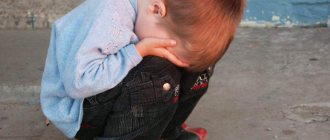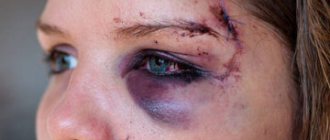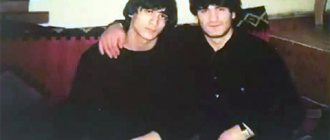There is no special law in Russian legislation that explains whether parents have the right to use “physical” methods to raise their child. At the same time, Article 63 of the Family Code of the Russian Federation obliges parents to take care of the physical health of their child.
In criminal law, a situation where a person is beaten is classified as battery or harm to health, as well as torture.
For each such act, criminal punishment is imposed. The commission of such actions by parents against children is an aggravating circumstance of the crime.
In modern realities, the ubiquitous guardianship quite often interferes with the process of raising a child. Parents may be accused of raising their child inappropriately, taking poor care of him, or beating him.
In this situation, parents can be helped by a lawyer involved in interaction with guardianship authorities.
Do you want to figure it out, but don’t have time to read the article? Lawyers will help
Entrust the task to professionals. Lawyers will complete the order at the cost you specify
116 lawyers on RTIGER.com can help with this issue
Solve the issue >
Is it possible to hit a child?
Is it acceptable to physically punish children for minor offenses - breaking a vase, dropping a flower pot, taking a toy from another child, tearing off wallpaper, saying an obscene word?
Yu.K .: No matter how terrible and disgusting your child’s offense may be, it is important not to take your emotions out on him, but to remain cold and reasonable. At the same time, the task of parents is not to knock out a sense of security and safety from the child at the time of punishment. That is, the main message should not be “You are bad,” but “You did a bad thing.” Do you feel the difference?
V.G .: If you decide to spank a child, then first stand at his level: kneel down or squat down to be at the same height as him. And then think about how he can answer you in the event of physical impact on him, how he can stand up for himself.
The worst thing for a little person is the inability to say: “You can’t behave like that with me and touch me with your hands.” Under no circumstances should you step over the assault zone.
What happens to the child during punishment?
Yu.K .: The most important and most terrible thing is the loss of a sense of security and safety. The very feeling that is the foundation for the healthy psychological development of a child. This mechanism is very similar to building a house: without a strong and stable foundation, it is impossible to build walls and lay a roof.
V.G .: If you swing at a child, then a physiological process begins: everything inside shrinks - especially the anus, sphincter. He wants to lock himself in a “house.” This horror that is directed at him, it blocks and creates a clamp in the entire blood flow, and this leads to hypoxia and the inability to respond correctly to the world around him. Hence the developmental delay.
What age is considered most sensitive when violent methods lead to serious problems?
Yu.K .: At any age, physical punishment is a huge stress. Until the age of three, a child is still emotionally connected to his mother, and if she causes him physical pain, this will certainly affect the psycho-emotional development of the baby. But even after three years, any physical influences will certainly leave a mark on his psyche. With the help of such punishments, you can teach your child to obey and fulfill desires in a way that suits you. But do not forget that, having left his parental family, he will take this skill with him: and who will he obey after you is a big question!
Article for child abuse
Punishment for child abuse is inevitable. Any violent actions that cause physical pain are subject to a fine of up to 30 thousand rubles, arrest for up to 15 days, and compulsory labor for up to 120 hours. Responsibility for beatings with hooligan motives:
- compulsory work up to 360 hours;
- correctional labor for up to 1 year;
- restriction of freedom up to 2 years;
- forced labor for up to 2 years;
- arrest for up to six months;
- imprisonment for up to 2 years.
If a child is physically injured, even slightly, the liability is greater. The applicable articles of the Criminal Code of the Russian Federation in this case depend on the severity of the damage. The severity of bodily injuries (external and internal) is determined based on the conclusion of a forensic expert.
Intentional infliction of physical or mental suffering on a minor through systematic beatings or violent acts is punishable under Art. 117 of the Criminal Code of the Russian Federation. The penalty is imprisonment for a term of 3 to 7 years.
In addition to responsibility for pain, torture, and harm to the health of the child, his parents or legal representatives are responsible for cruel treatment. The punishment for this is:
- fine up to 100 thousand rubles. or in the amount of the perpetrator’s income for a period of up to a year;
- compulsory work up to 440 hours;
- correctional labor for up to 2 years;
- forced labor or imprisonment for up to 3 years with possible deprivation of the right to engage in certain activities for up to 5 years.
What are the possible consequences for the psyche?
What can be the effect of a harmless, in the opinion of parents, slap on the lips and butt or a light blow with a belt?
Yu.K .: Any physical punishment, be it a blow, a slap, a slap on the head, a sharp tugging of the hand, has an equally negative effect on the child. Physical impact on a child is like fixing a microcircuit with a sledgehammer. With such methods, psychosexual development is inhibited: natural qualities and talents remain undeveloped. It's like picking a green orange from a tree and expecting it to be sweet.
V.G .: Children who constantly flinch in anticipation of physical punishment are unable to concentrate either on toys or on lessons.
During physical punishment, a child may develop fear of his parents: over time, this develops into neurosis, deep resentment and hatred. Against the backdrop of such a state, it is easier for the baby not to approach mom and dad, sit in a corner, and play alone. Such a child then has a very difficult time adapting to the world around him: in communicating with peers and other people in kindergarten and school.
I worked with children from 6 to 15 years old who hate their parents. They say: “I have to endure this,” “I don’t know when this will end,” “I wish they would just stop beating me.”
And we learn to open our hearts to love, tenderness and care. It is very difficult to “pull” them out. Parents in such situations sometimes say that their children have become withdrawn and closed. But the root cause is not the child: with each blow, the amount of resentment he feels grows, and his natural connection with his family is disrupted. There will never be mutual understanding in a family with violence.
A humiliated child is always alone. In this state, he can fall into bad company, begin to abuse bad habits, and think about suicide. He will try to find himself. It is impossible to change his worldview, because what he was not given, he will look for in “pleasure.”
A child who was beaten in childhood is always very wary of sudden movements and sounds when going out into the world. He can’t find friends, it’s hard for him to trust someone, and in relationships with his other half too. In the future, he will have low self-esteem and confidence in life and himself. And he will always be haunted by the right of the strong: either he will feel someone’s power over him, or he himself will begin to use it in relation to those who are weaker than him - his children, his partner.
How does physical violence affect your sense of personal boundaries?
Yu.K .: If the family does not take into account the child’s opinion, physical boundaries do not matter, and his emotions and attempts to say “no” cause irritation and aggression in the parents, then the world around will treat the child in the same way: for example, such a scenario - the future partner may also use physical and psychological violence against him. Such children, already as adults, most often enter into relationships with abusers.
V.G .: If you spanked a child at 1.5–2 years old, then you allowed him to touch his body cruelly. The moment the child enters the world around him, he will understand that he can be touched with force, rudeness, hatred and anger. This violates the boundaries of inviolability.
The mother's rights to the child during divorce in accordance with the law
Despite the fact that the practice has developed in such a way that in most cases, during a divorce, the child is left with his mother, the Family Code determines that any parent has the same rights and responsibilities in relation to children. This is expressly stated in Art. 61 SK.
On the other hand, the court is obliged to make a decision on the transfer of a small child to either of the parents only if this is in the interests of the minor. Factors that the judge takes into account (Article 65 of the Criminal Code):
- degree of parental affection (whom he loves more, with whom he communicates more);
- degree of attachment to other relatives (brothers, sisters, grandparents, etc.);
- personal, including moral qualities of spouses;
- the relationship that exists between the child and each parent;
- working hours of husband and wife;
- financial condition;
- occupation;
- marital status, etc.
How does physical punishment affect a child's health?
What parts of the body should never be hit and why?
V.G .: If you hit a child on the head, he may have minimal brain dysfunction, hematoma, hemorrhage, or microtrauma of the brain. If you hit the lips, it can cause injuries to the temple or frontal lobes.
It is impossible to calculate the force of a blow, which is why it is most often delivered in an emotional outburst. And then, in addition to the physical consequences, you can notice that the child begins to understand everything less and speaks poorly.
Such children begin to experience attention deficit and hyperactivity.
Accept your anger and work with it
Many parents complain: “I yell and hit my one-year-old or three-year-old child, I can’t control myself, what should I do?”
This is where the negative emotion “anger” comes into play. While children are small, mother spends more time with them. She is very tired and has no energy for positive experiences. She knows and uses various calming techniques, but still complains that “At a certain moment I lose my temper, scream, and now I’ve already beaten him... What should I do?”
First, you need to understand that we often take out our anger on those we love. Especially on those who are weaker or silent. Emotions exist separately from our love. They originate in the brain. It is necessary to share them with feelings.
Take time to delve into yourself, notice when you begin to experience anger, clearly understand - is it needed now? Will it help improve the situation or, on the contrary, will it only worsen it?
It’s better when a child is not beaten for a broken cup, but quickly puts the pieces together, kisses, hugs, says “it happens” and happy go on with their business. Everyone's mood improves.
Kiss, hug him. This will not make him grow up to be a pampered person. On the contrary, having received enough warmth and affection in childhood, in adulthood a person will not look for a “nanny” for himself, but someone to whom he can give his care.
Is it necessary to adopt parental experience?
Are there any statistics on what grown children who were previously beaten do to their children?
V.G .: In 90% of cases, a beaten child will do the same, because he does not know any other way. But there are also those who, having matured, understand that they do not want to act in such a cruel way with their baby.
Yu.K .: Parents often say: “I was beaten as a child, and nothing happened: I grew up to be a normal person!” But this is a big trap, because it is obvious that the parenting methods that were used 25-30 years ago are absolutely not suitable for modern children. The world, society, and the children themselves are different now. The volume of the psyche of modern children is many times greater than 30 years ago.
Parents beat their child, what should I do?
In Russia, 40% of serious violent crimes are committed in families. Children also suffer. They are killed, raped, beaten. As a rule, the torment of a child and the inappropriate behavior of fathers and mothers are noticeable to neighbors, but not every one of them knows where to turn for help.
The Criminal Code does not provide for liability for failure to report cases of beating of children to law enforcement agencies; this is a matter of conscience.
Caring people have many ways to protect a child within the framework of the law. To do this, there is no need to even enter into direct conflict with the offenders. There are structures that are obliged to ensure the safety of a child upon learning that he is being beaten.
How to properly punish children
What are the rules for how to respond to a child’s misbehavior while avoiding spanking and hitting?
It is important to remember that we punish a child in order to explain something to him, to teach him, to set the boundaries of what is permitted, and not to humiliate, insult and offend him.
- The punishment must be appropriate to the age and offense of the child.
- It should not cause any physical or psychological harm.
- Doesn’t work: “I’m taking your tablet away forever!” Children do not understand what “forever” means; it goes against their sense of time.
- You cannot punish with important things: food, sleep, reading, communication with friends and loved ones.
- Punishment should answer the questions: “For what?”, “To what extent?” and “For how long?”
- Once you have made your decision about punishment, it is extremely important that you carry it out.
- share with your friends!
Experts: Yunia Korneeva Victoria Anatolyevna Gabysheva
A peaceful way to solve a problem
When parents manage to independently agree on who the child will live with, this is undoubtedly wonderful. But to be on the safe side, all terms of the agreement can be recorded in writing. An agreement form is used for this. There are no clear requirements for the content of the agreement; it must contain information about who the child will remain with after the divorce, and how the parent who left the family will participate in his upbringing. Such an agreement can also be presented in court as evidence of the resolution of the issue of children. After all, the court is obliged, as part of the divorce process, to resolve the issue of the children’s place of residence.
Property issues can be further resolved by concluding an agreement on alimony, which must be certified by a notary. This removes the question of parental participation in the maintenance of the child.
Mistakes are part of life
Teach your children to this idea. Errors are an integral part of the learning process. Admit to yourself: “I beat my child.” Give him a hug and tell him straight out that you made a mistake. What to do? Ask for an opportunity to correct it. Children will understand that adults also make mistakes, but everything can be corrected. And then they will apply the same approach in another situation.
Some would argue that this is a long way to go. You can achieve something much faster if you use physical punishment from time to time.
But children remember the attitude towards them. Next time they will behave well not because they want to, but in order to avoid scolding from their parents, and not feel pushes and slaps. Or for a fee - toys, attractions, an extra hour on the computer.
And then they will give the same education, based on fear and profit, to their children.
Mothers often ask friends and specialists: “Why do I beat my older child, what should I do?” Because the little one is still weak and fragile, his parents don’t raise their hand to him. Bye. Later it will be his turn. In the meantime, the baby sees that the mother does not know how to restrain herself and not hit. He is happy with only one thing - good, I didn’t get it.
But this method will help to raise a weak creature who will try with all his might to avoid punishment, to be cunning, to dodge. A child whose parents don’t know how to stop yelling at a small child and hitting him on the bottom will begin to take revenge on his parents and take out his anger on those who are weaker (younger children, animals). Chain reaction. Therefore, physical violence is a dead end.
Teachers' responsibility for beating a child
Education workers also do not have the right to cause moral or physical harm to a child. A teacher may not insult, hit or humiliate a minor. Nevertheless, quite often teachers literally bully children. This phenomenon is more relevant for schools whose staff consists of workers of the old Soviet school.
The law protects the interests of children while at school. If a child has been subjected to mental or physical abuse by school staff, parents have the right to file a complaint with local education authorities. The following measures may be taken against a teacher or other school employee:
- reprimand, demotion;
- dismissal;
- deprivation or restriction of freedom.










